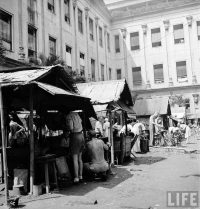The Japs had always been camera-crazy, but here in camp they had gone completely shutter-happy. Every day was a field day for them, as officers, soldiers, and civilians snapped our pictures at every opportunity. They took our pictures at the chow lines, at the gates while we waited for our packages, and in the corridors and grounds as we ate our meals. Apparently, they wanted to prove to the rest of the world what a cozy and comfortable group we were!
Compared to other prison camps, perhaps we were comfortable, and the food, such as it was, was not starvation fare. Many of us had beds, mattresses, cooking utensils, stoves, and a supply of canned goods, but it was our money that had furnished it. It was the Red Cross who fed us and helped to furnish the hospital and kitchens with equipment and supplies. It was money collected from internees that provided the additional plumbing facilities in camp, and it was internee labor that had installed all of it.
The Japanese dumped us into this university campus without food, supplies, or facilities to house close to four thousand men, women, and children.
As I looked at the faces of my roommates, I could see the changes caused by fifteen weeks of concentration-camp life. Many were thinner, and their faces were strained and anxious-looking. They talked more. Their voices seemed shriller, and their laughter verged on the hysterical.
Sophie had us all giggling like high school girls when she told us of the conversation she overheard between two precocious little boys near the Annex.
Said one little fellow mysteriously, “I know how to get out of here.”
“Tll bet you don’t know! How?” came from the second little fellow.
“Just get pregnant!” said the wise little man.
